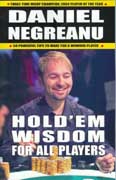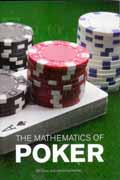
Hold'em Wisdom For All Players

Mathematics of Poker
Negreanu's Wisdom A Winner; Math Of Poker Super, Advanced
 Howard Schwartz, the "librarian for gamblers," is the marketing director for Gambler's Book Club in Las Vegas, a position he has held since 1979. Author of hundreds of articles on gambling, his weekly book reviews appear in numerous publications throughout the gaming industry. Howard's website is www.gamblersbook.com (166 pages, paperbound, $14.95) and The Mathematics of Poker by Bill Chen and Jerrod Ankenman (381 pages, paperbound, $29.95). Both titles have been in the works for some time, and they are sure to find their way into every serious player’s library.
Howard Schwartz, the "librarian for gamblers," is the marketing director for Gambler's Book Club in Las Vegas, a position he has held since 1979. Author of hundreds of articles on gambling, his weekly book reviews appear in numerous publications throughout the gaming industry. Howard's website is www.gamblersbook.com (166 pages, paperbound, $14.95) and The Mathematics of Poker by Bill Chen and Jerrod Ankenman (381 pages, paperbound, $29.95). Both titles have been in the works for some time, and they are sure to find their way into every serious player’s library.
Negreanu, three-time champ at the World Series of Poker and 2004 Player of the Year, is one of the most personable players on the circuit—and one of the most talented. This is his first book, with Tom Mills doing a first class job of editing. (I sometimes believe editors never get the credit they should for the toughest part of producing a book—making it one of clarity and accuracy.)
A good way of teaching anything is to offer tips or lessons, providing examples and diagramming where opponents have placed potential booby traps and land mines. This methodology works for beginning poker players and it also helps improve the experienced player’s game by pointing out gaps in his or her game. After all; poker is a form of war, where skill and the art of out-maneuvering the opponent become key to winning the battle (or the tournament).
Negreanu, who has seen the best and the worst of players, covers much territory. Among the 50 lessons are topics such as:To Show or not to Show (revealing your hole cards); Beating Up on the Weak Player; Bullying a Bully; The Deadly All-In Bet; The Value of Suited Cards; Stealing Blinds; Pondering Jacks; The Top 10 Trouble Hands. He continues with discussions and warnings about Isolating Your Opponent in Limit Hold‘em; Playing Trash Hands; Dangerous Hands to Play; Playing on a Short Stack; Don’t Get Married to Your Aces; Table Position; Setting Up a Bluff; Suited Connectors; Poker Math; Pot Odds; why Soft Playing is Cheating; Heads-Up Poker; Exploiting Your Table Image; Dealing with Bad Beats.
A good portion of what Negreanu discusses has been published in one form or another in other books, but here it seems clearer, more organized—to the point you might say.
Negreanu’s name is magic among poker aficionados. Classy, knowledgeable, polite and consistent, he is extremely dangerous because he can shift gears as well as anyone, and this book of wisdom shows you how to do it as well.
The next Negreanu book is due in 2007—we hear it will be more advanced and is going to be a monster—600 page or more. Until that blockbuster comes along, be happy with this little gem—priced right and packed with valuable advice for any level player.
The Mathematics of Poker by Chen and Ankenman was first mentioned in Mark Matros’ The Making of a Poker Player in 2005. Immediately there were requests and queries about the book.Although there are several books already on the market analyzing poker odds and probabilities, including Mike Petriv’s Hold‘em’s Odds Book; Texas Hold'em Odds and Probabilities by Matthew Hilger and Texas Hold’em Odds by Catalin Barboianu, this one could be used to teach a poker or mathematics department at some college. (This is virtually the same idea expressed in by Chris Ferguson, himself a UCLA graduate).
David Sklansky, who does not often offer written kudos for poker books, says the authors “…do a terrific job explaining how math can, among other things, show you exactly how to mix up your play in such a way than even champion players cannot get the best of you. Especially those champions who don’t read this book.”
If you enjoy game theory and wonder about its relationship to poker and being a winner at the table, this book is right on the button for you. You may not need a doctorate in mathematics to handle this work, but a good background in the subject would help. There is great emphasis on quantitative methods and modeling and there is great emphasis on strategy as the authors say, “…contrasted to an emphasis on decisions.”
“It is a book about how to think about poker…devoted to examining the issues that are of importance in determining a strategy.” In short, the authors “offer a roadmap to how to think about optimal poker.”
There are 30 chapters to this landmark work, and they are broken down into five major sections. The Basics includes discussions of probability and risk and Bayes’ Theorem. Exploitive Play covers Pot Odds and Implied Odds; Reading Hands and Strategies; Topics in Inline Poker; Cards Exposed Situations. In the third section, the largest in the book, the authors examine Game Theory; the Jam-Or-Fold Game; No-Limit Bet Sizing; the No-Limit AKQ Game; Small Bets, Big Pots: No-Fold Games.
The section on Risk includes the Risk of Ruin; the Kelly Criterion and Rational Game Selection, while a final section focuses on tournaments and Using Math to Improve Play.
Packed with tables, charts, examples, equations and key concepts, this is a book to be consumed slowly, re-read constantly, underlined and applied correctly by patient, intelligent players. What a marvelous book!

